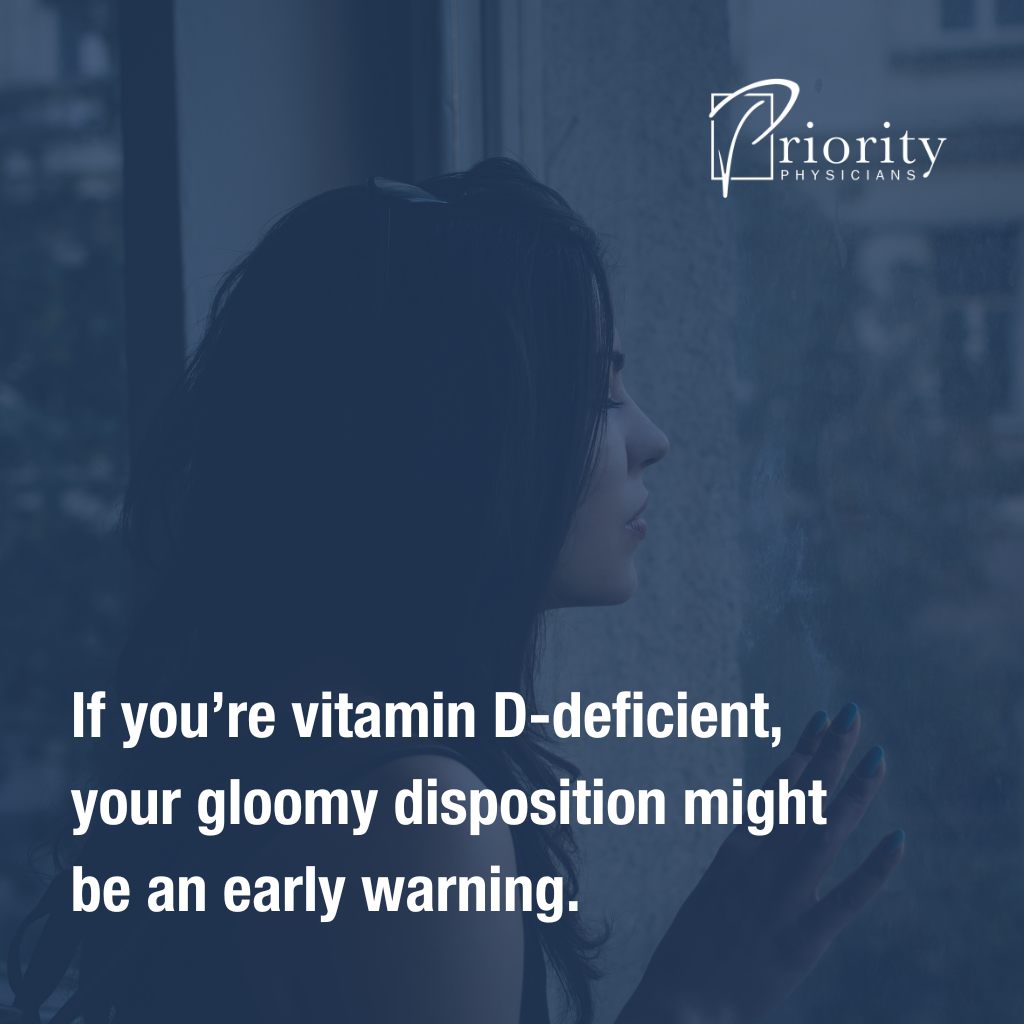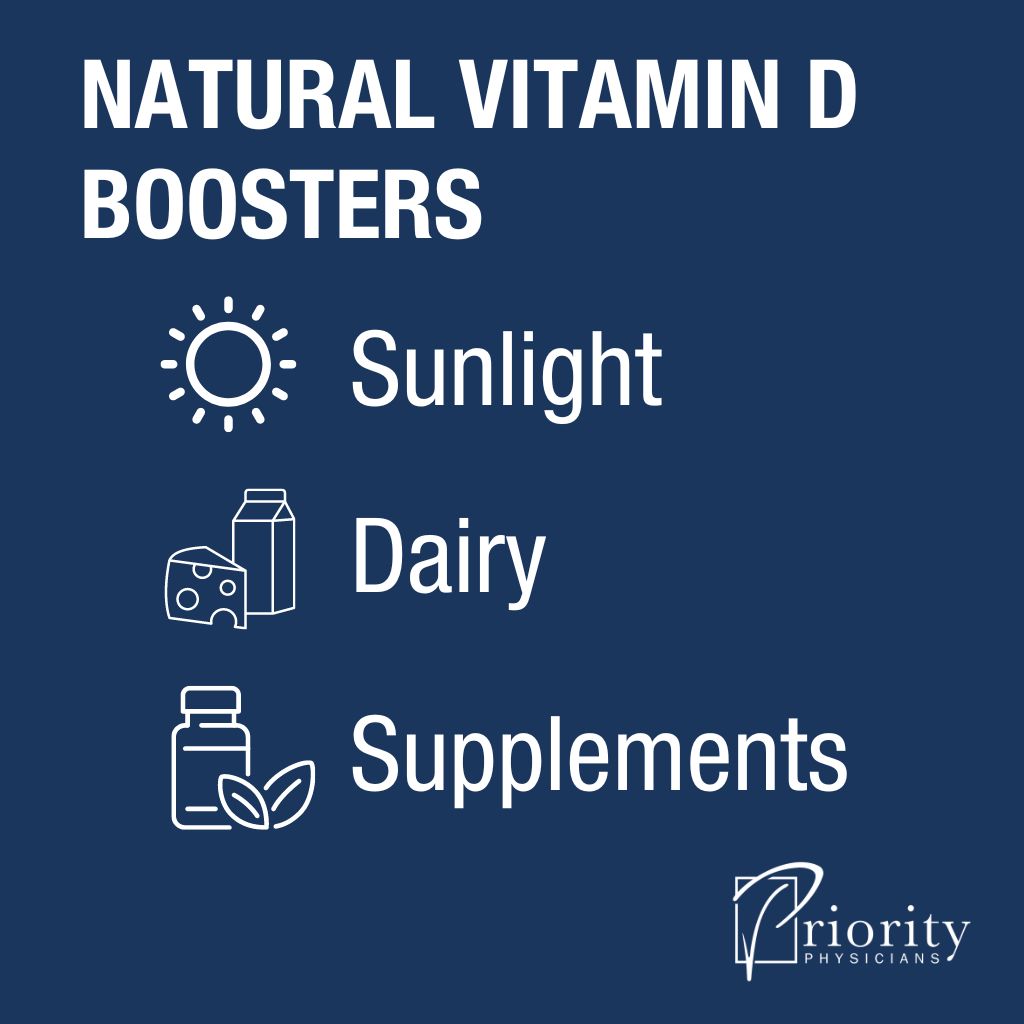Do several days of gray skies make you feel down? And when the sun finally emerges, does your mood lift dramatically?
The catalyst may be vitamin D, the “sunshine vitamin.” When your skin is exposed to sunlight, it manufactures vitamin D3, the active form of D in your body.
Vitamin D is essential to bone and cell growth, muscle function, and a robust immune system. It lowers your risk of heart attack and stroke and can decrease the severity of arthritis symptoms and other aches and pains. Practiced safely, regular exposure to the sun is a natural way to get the levels of vitamin D your body needs.
On the other hand, a vitamin D deficiency can cause fatigue, bone and muscle pain or weakness, hair loss, or impaired wound healing. If you’re vitamin D-deficient, your gloomy disposition might be an early warning.
Exactly how does vitamin D affect mood? Let’s explore.

About Vitamin D
Vitamin D is one of four steroid vitamins, which also include A, E, and K. These vitamins take longer for our bodies to absorb than water-soluble vitamins because they’re fat-soluble. But once stored in the liver and fatty tissues, they last longer.
So, how does vitamin D affect mood? It makes the enzyme that creates more serotonin — the happy hormone — in our brains. When we’re well-supplied with vitamin D, the result is an upbeat emotional state.
On the other hand, a pervasive feeling of melancholy or glumness may indicate you need more vitamin D. D deficiency brings down your mood — it gives you that slightly depressive, “glass half-empty” view on life. And as you feel less happy, anxiety may grow as well.
Most Americans’ serum levels of vitamin D tend to be in the low range — 20–30 nmol/L. These low levels of D can leave a patient feeling down, with non-specific aches, malaise, and discomfort. In traditional healthcare, many doctors in the U.S. routinely treat these mood conditions with prescription medication.
Compare that to Europe, where physicians with a despondent or anxious patient first look carefully at vitamin D levels. If the patient appears low, they’re often treated by increasing their serum concentration of D to 50–75 nmol/L — double what’s typical in the U.S.

Natural Vitamin D Boosters
In many cases, it’s possible to elevate your mood safely and naturally by raising your level of vitamin D. Here are some simple ways to help boost it without the use of medications:
Sunlight
As more people work from home and “indoor” lifestyles become more prevalent, the risk for D deficiency is growing. But simply spending a little more time in the sun each day can help.
Does that mean continually hitting the beach or the tanning bed? No — finding the right balance is key. How much vitamin D you get from sun exposure varies from person to person and depends on ethnicity, where you live, how long you like to be outdoors, and at what time of day.
Our advice:
- We’re all aware that too much exposure to ultraviolet (UV) rays may cause skin cancer. Try for about 15–20 minutes of sunlight each day, then apply sunscreen.
- But be cognizant of how much sunblock you use. An excessive amount, worn all day long in moisturizers and cosmetics, prevents absorption of D, creating the D deficiency you’re trying to avoid.
Dairy
In the U.S., dairy products such as milk and yogurt are typically fortified with vitamin D, another natural way to get more of the vitamin. Certain non-dairy milks, orange juice, and cereals are fortified as well.
But if you’re lactose-intolerant or just don’t like the taste of some of these foods, supplementation is an option.
Supplements
Traditionally, the U.S. Recommended Dietary Allowance of vitamin D for men and women under 70 is 600 International Units (IU).
Some patients try to adjust their intake by self-experimenting with vitamin D supplements.
But just because a supplement’s available over the counter doesn’t make it safe. And self-dosing could cause you to retain more of the vitamin than your body needs.
People who take an overabundance of D begin to feel generally unwell. They may experience confusion, vomiting, or changes in appetite. Too much vitamin D also causes excess calcium in the kidneys, creating kidney stones, or it can affect the ability to perceive thirst, resulting in dehydration.
Patients come in all shapes and sizes, and most require specific vitamin D dosage recommendations. This should always be managed in a controlled clinical setting monitored by your concierge physician rather than by trial-and-error with OTC supplements.
Finding the Right Balance
So, does vitamin D affect mood? Definitely. In good balance, it brings a happy, contented feeling, but a deficiency can bring on long-term sadness.
Before boosting your vitamin D through supplements, try the natural approach. As practical advice, choose foods that deliver a healthy supply of vitamin D. And enjoy the feel of the sun on your skin by taking a walk or gardening for 15–20 minutes a day.
If glum feelings persist, have a chat with your Priority Physicians doctor. We can answer your questions, screen for your levels of vitamin D, and advise an approach to getting you back to your normal, happy self.

